又论书(文言文翻译、英语翻译)
英语翻译考研文言文
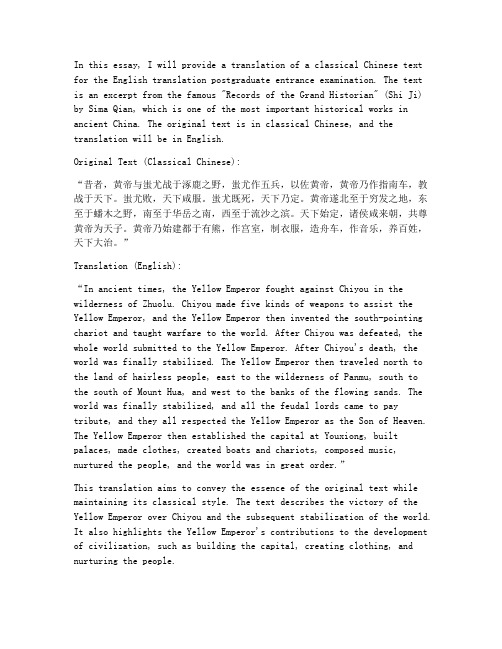
In this essay, I will provide a translation of a classical Chinese text for the English translation postgraduate entrance examination. The text is an excerpt from the famous "Records of the Grand Historian" (Shi Ji) by Sima Qian, which is one of the most important historical works in ancient China. The original text is in classical Chinese, and the translation will be in English.Original Text (Classical Chinese):“昔者,黄帝与蚩尤战于涿鹿之野,蚩尤作五兵,以佐黄帝,黄帝乃作指南车,教战于天下。
蚩尤败,天下咸服。
蚩尤既死,天下乃定。
黄帝遂北至于穷发之地,东至于蟠木之野,南至于华岳之南,西至于流沙之滨。
天下始定,诸侯咸来朝,共尊黄帝为天子。
黄帝乃始建都于有熊,作宫室,制衣服,造舟车,作音乐,养百姓,天下大治。
”Translation (English):“In ancient times, the Yellow Emperor fought against Chiyou in the wilderness of Zhuolu. Chiyou made five kinds of weapons to assist the Yellow Emperor, and the Yellow Emperor then invented the south-pointing chariot and taught warfare to the world. After Chiyou was defeated, the whole world submitted to the Yellow Emperor. After Chiyou's death, the world was finally stabilized. The Yellow Emperor then traveled north to the land of hairless people, east to the wilderness of Panmu, south to the south of Mount Hua, and west to the banks of the flowing sands. The world was finally stabilized, and all the feudal lords came to pay tribute, and they all respected the Yellow Emperor as the Son of Heaven. The Yellow Emperor then established the capital at Youxiong, built palaces, made clothes, created boats and chariots, composed music, nurtured the people, and the world was in great order.”This translation aims to convey the essence of the original text while maintaining its classical style. The text describes the victory of the Yellow Emperor over Chiyou and the subsequent stabilization of the world. It also highlights the Yellow Emperor's contributions to the development of civilization, such as building the capital, creating clothing, and nurturing the people.In translating this text, I focused on the following aspects:1. Retaining the classical style: The translation maintains the formal and elegant tone of the original text, using words and expressions that reflect the style of classical Chinese literature.2. Preserving the meaning: The translation aims to convey the original meaning of the text, ensuring that readers can understand the historical events and the Yellow Emperor's contributions.3. Translating proper nouns: Proper nouns such as the Yellow Emperor, Chiyou, Zhuolu, and Youxiong are translated accurately to maintain the original meaning.4. Describing geographical locations: Geographical locations such as the wilderness of Zhuolu, the land of hairless people, and the banks of the flowing sands are translated in a way that is clear and understandable to English-speaking readers.5. Conveying cultural elements: The translation attempts to convey the cultural elements present in the original text, such as the south-pointing chariot and the creation of clothing, to give readers a sense of the ancient Chinese civilization.In conclusion, this translation aims to provide an accurate and elegant representation of the classical Chinese text, enabling English-speaking readers to appreciate the historical and cultural significance of the Yellow Emperor's reign.。
太宗论学文言文翻译
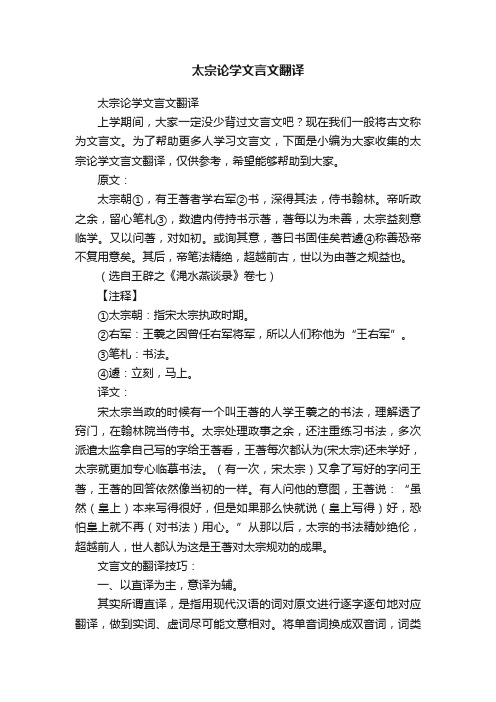
太宗论学文言文翻译太宗论学文言文翻译上学期间,大家一定没少背过文言文吧?现在我们一般将古文称为文言文。
为了帮助更多人学习文言文,下面是小编为大家收集的太宗论学文言文翻译,仅供参考,希望能够帮助到大家。
原文:太宗朝①,有王著者学右军②书,深得其法,侍书翰林。
帝听政之余,留心笔札③,数遣内侍持书示著,著每以为未善,太宗益刻意临学。
又以问著,对如初。
或询其意,著曰书固佳矣若遽④称善恐帝不复用意矣。
其后,帝笔法精绝,超越前古,世以为由著之规益也。
(选自王辟之《渑水燕谈录》卷七)【注释】①太宗朝:指宋太宗执政时期。
②右军:王羲之因曾任右军将军,所以人们称他为“王右军”。
③笔札:书法。
④遽:立刻,马上。
译文:宋太宗当政的时候有一个叫王著的人学王羲之的书法,理解透了窍门,在翰林院当侍书。
太宗处理政事之余,还注重练习书法,多次派遣太监拿自己写的字给王著看,王著每次都认为(宋太宗)还未学好,太宗就更加专心临摹书法。
(有一次,宋太宗)又拿了写好的字问王著,王著的回答依然像当初的一样。
有人问他的意图,王著说:“虽然(皇上)本来写得很好,但是如果那么快就说(皇上写得)好,恐怕皇上就不再(对书法)用心。
”从那以后,太宗的书法精妙绝伦,超越前人,世人都认为这是王著对太宗规劝的成果。
文言文的翻译技巧:一、以直译为主,意译为辅。
其实所谓直译,是指用现代汉语的词对原文进行逐字逐句地对应翻译,做到实词、虚词尽可能文意相对。
将单音词换成双音词,词类活用词换成活用后的词,通假字换成本字。
直译的好处是字字落实,其不足之处是有时译句文意难懂,语言也不够通顺。
所谓的意译,则是根据语句的意思进行翻译,做到尽量符合原文意思,语句尽可能照顾原文词义。
意译有一定的灵活性,文字可增可减,词语的.位置可以变化,句式也可以变化。
意译的好处是文意连贯,译文符合现代语言的表达习惯,比较通顺、流畅、好懂。
不足之处是有时不能做到字字落实。
二、翻译原则:信、达、雅“信”就是要求译文准确表达原文的意思,不歪曲,不遗漏,不多余。
文言文英语翻译经典句子
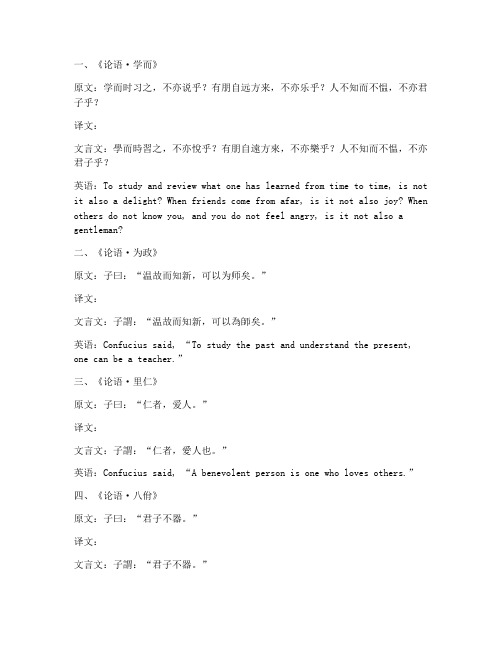
一、《论语·学而》原文:学而时习之,不亦说乎?有朋自远方来,不亦乐乎?人不知而不愠,不亦君子乎?译文:文言文:學而時習之,不亦悅乎?有朋自遠方來,不亦樂乎?人不知而不愠,不亦君子乎?英语:To study and review what one has learned from time to time, is not it also a delight? When friends come from afar, is it not also joy? When others do not know you, and you do not feel angry, is it not also a gentleman?二、《论语·为政》原文:子曰:“温故而知新,可以为师矣。
”译文:文言文:子謂:“温故而知新,可以為師矣。
”英语:Confucius said, “To study the past and understand the present, one can be a teacher.”三、《论语·里仁》原文:子曰:“仁者,爱人。
”译文:文言文:子謂:“仁者,愛人也。
”英语:Confucius said, “A benevolent person is one who loves others.”四、《论语·八佾》原文:子曰:“君子不器。
”译文:文言文:子謂:“君子不器。
”英语:Confucius said, “A gentleman is not a tool.”五、《论语·述而》原文:子曰:“三人行,必有我师焉。
择其善者而从之,其不善者而改之。
”译文:文言文:子謂:“三人行,必有我師焉。
選其善者而從之,其不善者而改之。
”英语:Confucius said, “Among three people walking together, there must be someone I can learn from. I will follow the good ones and correct the bad ones.”六、《论语·泰伯》原文:曾子曰:“君子以文会友,以友辅仁。
英语翻译文言文

孔子问:“敢问老丈高寿几何?”老者微笑曰:“吾年已八旬,然自幼习道,养生有术,故能老当益壮,精神矍铄。
”孔子曰:“老丈所言之养生之道,敢请赐教?”老者曰:“养生之道,首在修身。
修身者,养心也。
心正则身正,身正则天下归心。
其次,宜动静结合,劳逸适度。
动以养形,静以养神。
饮食有节,起居有常,如此方能延年益寿。
”孔子闻言,茅塞顿开,曰:“善哉斯言!吾自幼受业,未曾闻此高论。
敢问老丈,如何修身养性?”老者答曰:“修身养性,须从心性着手。
心性者,道德之根本也。
道德者,人心之准则也。
心性不正,道德不立,人将失其本真。
故修身养性,宜从正心诚意做起。
正心诚意,则能明辨是非,洞察秋毫。
如此,方能行善积德,成为君子。
”孔子再问:“君子之行,有何特征?”老者曰:“君子之行,以仁为本,以礼为表。
仁者爱人,礼者敬人。
仁者无私,礼者有度。
君子不患人之不己知,患不知人也。
君子之道,宽以待人,严以律己。
如此,方能成就大业,名垂青史。
”孔子听后,感慨万分,曰:“老丈之言,如春风化雨,使我茅塞顿开。
吾将牢记于心,身体力行。
”孔子与老者交谈数日,受益匪浅。
自此,孔子更加注重修身养性,弘扬仁义道德,广施教化,传道授业解惑,成为一代圣人。
译文:Once upon a time, Confucius traveled to the state of Huan and met an old man with white beard and eyebrows, and a youthful appearance. His demeanor was serene and composed. Confucius, seeing this, exclaimed in admiration and engaged in conversation with him. The old man said, "I have heard of your virtue, spreading throughout the world. To meet you today is indeed a great fortune of three lifetimes."Confucius asked, "May I inquire, how old are you, old gentleman?"The old man smiled and said, "I am now eighty years old, but since my youth, I have practiced the way of cultivating the body and the mind,and have mastered the art of longevity, so that I can grow older and become even stronger, with my spirit still vigorous."Confucius said, "The way of cultivating the body and the mind that you mentioned, may I please hear your teachings?"The old man replied, "The way of cultivating the body and the mind,first and foremost, lies in cultivating the mind. Cultivating the mind means cultivating the heart. When the heart is right, the body is right, and when the body is right, the world will follow the heart. Secondly, one should combine activity with rest, and maintain a balance between work and leisure. Activity nourishes the body, and stillness nourishes the spirit. One should have a regulated diet and regular habits, so that one can extend one's lifespan."Upon hearing this, Confucius was enlightened, saying, "Your words are indeed profound! Since my youth, I have studied but never。
属文言文英语翻译
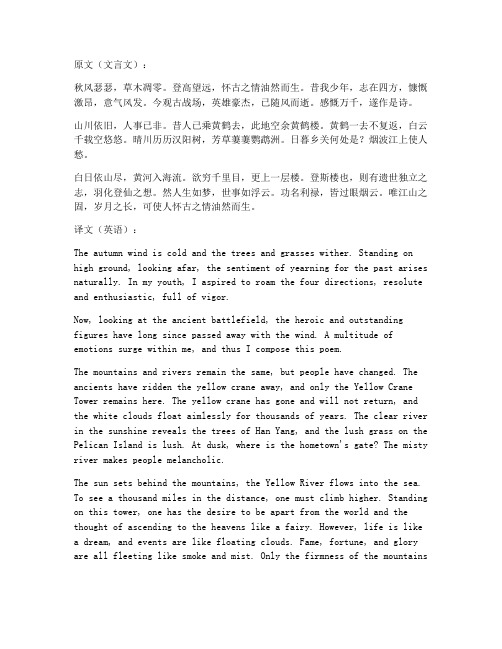
原文(文言文):秋风瑟瑟,草木凋零。
登高望远,怀古之情油然而生。
昔我少年,志在四方,慷慨激昂,意气风发。
今观古战场,英雄豪杰,已随风而逝。
感慨万千,遂作是诗。
山川依旧,人事已非。
昔人已乘黄鹤去,此地空余黄鹤楼。
黄鹤一去不复返,白云千载空悠悠。
晴川历历汉阳树,芳草萋萋鹦鹉洲。
日暮乡关何处是?烟波江上使人愁。
白日依山尽,黄河入海流。
欲穷千里目,更上一层楼。
登斯楼也,则有遗世独立之志,羽化登仙之想。
然人生如梦,世事如浮云。
功名利禄,皆过眼烟云。
唯江山之固,岁月之长,可使人怀古之情油然而生。
译文(英语):The autumn wind is cold and the trees and grasses wither. Standing on high ground, looking afar, the sentiment of yearning for the past arises naturally. In my youth, I aspired to roam the four directions, resolute and enthusiastic, full of vigor.Now, looking at the ancient battlefield, the heroic and outstanding figures have long since passed away with the wind. A multitude of emotions surge within me, and thus I compose this poem.The mountains and rivers remain the same, but people have changed. The ancients have ridden the yellow crane away, and only the Yellow Crane Tower remains here. The yellow crane has gone and will not return, and the white clouds float aimlessly for thousands of years. The clear river in the sunshine reveals the trees of Han Yang, and the lush grass on the Pelican Island is lush. At dusk, where is the hometown's gate? The misty river makes people melancholic.The sun sets behind the mountains, the Yellow River flows into the sea. To see a thousand miles in the distance, one must climb higher. Standing on this tower, one has the desire to be apart from the world and the thought of ascending to the heavens like a fairy. However, life is like a dream, and events are like floating clouds. Fame, fortune, and glory are all fleeting like smoke and mist. Only the firmness of the mountainsand rivers, and the longevity of time, can evoke the sentiment of yearning for the past.(注:此译文为意译,力求传达原文的情感和意境。
古话文言文英语翻译

夫志者,气之帅也;气者,体之充也。
志不强者,智不达;气不充者,体不坚。
是以古之达人,必先养其志,而后求其智;必先养其气,而后求其勇。
志不强者,其智必弱;气不充者,其体必弱。
是以欲成大业,必先强其志,充其气。
古人云:“千里之行,始于足下。
”故欲成大事,必先从近处做起,从小事做起。
积小成大,积少成多,乃成其大业。
孔子曰:“不积跬步,无以至千里;不积小流,无以成江海。
”是以古人治学,皆从一物一事始,渐而至于万物万事。
又云:“三人行,必有我师。
”故学者当虚心求教,不耻下问。
古之圣贤,如孔子、孟子、老子、庄子等,皆以博学多才著称。
孔子曰:“学而不思则罔,思而不学则殆。
”是以学者必深思而慎取,不可轻信人言。
夫学之道,莫先于立志。
志立则学有定向,心不外驰。
古人有云:“志之所趋,无远勿届;志之所向,无坚不入。
”是以立志者,当以天下为己任,以万世为久远。
又云:“君子务本,本立而道生。
”故学者必务根本,不可舍本逐末。
本者,道德也;末者,技艺也。
道德为本,技艺为末。
道德不明,技艺无由而成。
是以学者必先修身齐家治国平天下,而后可以言技艺。
孔子曰:“仁者爱人。
”是以古之仁人,皆以仁为本。
仁者,爱人也;智者,知人也。
爱人者,必能自爱;知人者,必能自知己所不能。
是以仁者不忧,智者不惑。
又云:“智者乐水,仁者乐山。
”故学者必乐其学,乐其道。
乐学则学不辍,乐道则道不迷。
是以学者必乐天知命,乐地安土。
综上所述,古之立大事者,必先立其志,养其气,博学多才,修身齐家治国平天下。
如此,方能成就大业,名垂青史。
英文翻译:The establishment of great causes is not only due to extraordinary talents, but also to an indomitable will. Such individuals are rare in the world, hence they are able to accomplish great achievements. Therefore, ancient sages all hold their principles as a self-weight, adhere to their principles as self-support, do not follow the current trends, and do not conform to the common customs. Thus, they can remain upright in turbulent times and not change their resolve in poverty and lowliness.The will is the leader of the spirit; the spirit is the essence of the body. Those with weak wills cannot achieve wisdom; those with insufficient spirit cannot maintain a strong body. Therefore, ancient scholars must first cultivate their will, then seek wisdom; first cultivate their spirit, then seek courage. Those with weak wills will have weak wisdom; those with insufficient spirit will have weak bodies. Therefore,。
好句文言文英语翻译

原文:遥望洞庭山水翠,白银盘里一青螺。
此中有真意,欲辨已忘言。
采菊东篱下,悠然见南山。
山重水复疑无路,柳暗花明又一村。
桃花尽日随流水,洞在清溪何处边?翻译:1. 遥望洞庭山水翠,白银盘里一青螺。
Remote from afar, the mountains and rivers of Dongting are lush green; within the silver plate, there lies a green snail.2. 此中有真意,欲辨已忘言。
There is a true meaning within, yet when trying to explain, words have already slipped away.3. 采菊东篱下,悠然见南山。
Picking chrysanthemums beneath the eastern fence, I leisurely gaze upon the Southern Mountain.4. 山重水复疑无路,柳暗花明又一村。
The mountains are steep and the waters are winding, causing doubtthat there is no path; yet with the shadows of willows and thebrightness of flowers, another village appears.5. 桃花尽日随流水,洞在清溪何处边?The peach blossoms float all day with the flowing water; where is the cave by the clear stream?6. 此处人迹罕至,落英缤纷,芳草鲜美,落英缤纷。
Here, the footprints of people are rare, the fallen petals are scattered, the grass is lush and fresh, and the petals are falling in profusion.7. 隐逸之士,避世而居,不知有汉,无论魏晋。
欧阳修,字永书,庐陵人原文及翻译

欧阳修,字永书,庐陵人原文及翻译欧阳修,字永书,庐陵人原文及翻译 1欧阳修,幼敏悟过人,读书辄成诵。
及冠,嶷然有声①。
得唐韩愈遗稿于废书簏中,读而心慕焉。
修始在滁州,号醉翁,晚更号六一居士。
天资刚劲,见义勇为,虽机阱②在前,触发之不顾。
放逐流离,至于再三,志气自若也。
方贬夷陵时,无以自遣,因取旧案反覆观之,见其枉直乖错不可胜数,于是仰天叹曰:“以荒远小邑,且如此,天下固可知。
”自尔,遇事不敢忽也。
学者求见,所与言,未尝及文章,惟谈吏事,谓文章止于润身,政事可以及物。
凡历数郡,不见治迹,不求声誉,宽简③而不扰,故所至民便④之。
或问:“为政宽简,而事不弛废,何也?”曰:“以纵为宽,以略为简,则政事弛废,而民受其弊。
吾所谓宽者,不为苛急;简者,不为繁碎耳。
”(节选自《宋史·欧阳修传》)欧阳修,字永书,庐陵人原文及翻译 2出处:《宋史·欧阳修传》原文:欧阳修,字永叔,庐陵人。
四岁而孤,母郑,守节自誓,亲诲之学。
家贫,至以荻画地学书。
幼敏悟过人,读书辄成诵。
及冠,嶷然有声。
修始在滁州,号醉翁,晚更号六一居士。
天资刚劲,见义勇为,虽机阱在前,触发之不顾。
放逐流离,至于再三,志气自若也。
翻译:欧阳修字永叔,庐陵人。
四岁时便死了父亲,母亲郑氏决心不改嫁,(在家)亲自教欧阳修读书学习。
因家里贫穷,以至于只能用芦荻在地上练习写字。
幼年时,欧阳修就聪敏过人,读过一遍书就能背诵下来。
等到成年时,更是人品超群而享有盛誉。
欧阳修开始在滁州工作,名字叫醉翁。
晚年改为六一。
他天性刚直,胆子大。
即使前方有陷阱,他也绝不回头。
即使他被多次贬低,他的野心仍然不变。
谢谢~3. 【英语翻译欧阳修,字永叔,庐陵人.四岁而孤,母郑,亲诲之学,家欧阳修字永叔,庐陵人.四岁时即死了父亲,母亲郑氏一直守节未嫁,在家亲自教欧阳修读书学习.因家里贫穷,以至于只能用芦荻作笔,在地上学习写字.幼年时,欧阳修就聪敏过人,读书过目不忘.等到成年时,更是超群出众,卓有声誉.宋朝立国已有百余年,而文章体裁风格仍然承袭五代之陈规遗风,士人大多因循守旧,所作文章见识浅薄,格调不高.苏舜元、苏舜钦、柳开、穆修等人都曾想创作古文并借此大力提供,以改变当时的文风,但因笔力不足而未能如愿.欧阳修随叔父欧阳晔任职于承受州时,在当地一大姓李氏家的废书筐中发现了唐代韩愈的遗稿《昌黎先生文集》,读后十分仰慕.于是用心寻求其中的精义,以至废寝忘食,决心要追赶他,和他并驾齐驱.考进士,名列第一,选拔到甲科,并被任命为西京推官.以后欧阳修回京返朝,升为馆阁校勘.欧阳修论事切直了当,因此有些人把他看作仇敌一样,唯儿仁宗勉励他敢于说话,当面赐他五品官的服饰,对侍臣说:“像欧阳修这样的人,到哪里去原著啊?”让他同修起居注,于是又让他掌管制诰.按惯例,对这个官职必须先考试而后才能任命,仁宗了解欧阳修,诏令特意授予他.主持嘉佑二年(1056)礼部进士的考试.当时士子崇尚作新奇怪的文章,号称“太学体”,欧阳修对那些险怪奇涩的文字,坚决加以排斥,凡是像这样的都不予录取.录取之事完结后,过去那些文字浮薄而又喜欢自我标榜的人等欧阳修一出现,就聚在他的马前起哄,巡街的士兵都无法制止;但是考场的文风,也从此大为改变了.欧阳修以高风亮节严格要求自己,因多次遭到污蔑,六十岁时,就接连上书请求告老退休,皇上则下诏书对他尊宠有加,不让他退休.及任职青州时,又因为请求停止发青苗钱,而遭到王安石的诋毁,所发乞求退休更加迫节.熙宁五年(1072年),去世,追封为太子太师,谥号为文忠.欧阳修的文章,才华横溢,朴实流畅,文字的多少恰到好处.议论上,简单而明了,精确而通情,善于联系事物分析不同问题,阐明深刻的道理,驳斥其错误,有很强的说服力.他的超然独到之处,文情奔放的风格,别人是无法赶上的,所以天下人一致效法尊崇他.他提携后进,唯恐不及,得到他赏识、举荐的人,大多成为天下的名士.曾巩、王安石、苏洵以及苏洵的儿子苏轼、苏辙,原来都寂然无声,不为人所知晓,欧阳修就广泛宣传他们的声名,认为他们将来一定会名闻于世.欧阳修对朋友非常忠实,朋友在世时就推荐帮助他们,朋友去世后就尽力保护周济他们的家庭.他奉皇帝的命令纂修《唐书》的纪、志、表,又独立写成了《新五代史》,笔法严谨而文字简练,大多继承了《春秋》笔法.苏轼为欧阳修文集作序说:“论说道理与韩愈相似,议论政事与陆贽相似,记叙事情与司马迁相似,诗词歌赋与李白相似.”有见识的人认为这番评论是很有见地的.。
文言文英语翻译情话

彼时,春风拂面,杨柳依依。
余执子之手,共赏花影。
愿言不违,执子之手,与子偕老。
此时此刻,吾心之所系,唯有汝一人而已。
译曰:In those days, the spring breeze caressed our faces, willowsgently swayed. I held your hand, together admiring the shadows of the flowers. I wish my words to never falter, holding your hand, I wish to grow old with you. At this moment, what I hold dear in my heart is only you.月下相逢,清辉洒落。
余目遇汝容,心旌摇曳。
情之所钟,正在汝身。
愿为连理,永结同心。
翻译为:Under the moonlight, we met, its clear glow洒落。
My eyes met your face, my heart fluttered. The love in my heart is centered on you. I wish to be intertwined with you, to forever bind our hearts together.山盟海誓,永不分离。
汝若西去,吾随东行;汝若南迁,吾随北往。
无论天涯海角,吾心常随汝行。
译曰:Mountains and seas have sworn eternal promises,never to be separated. If you go west, I will follow east; if you move south, I will go north. No matter the ends of the earth, my heart will always accompany you.悠悠岁月,情深似海。
英语翻译文言文心得体会
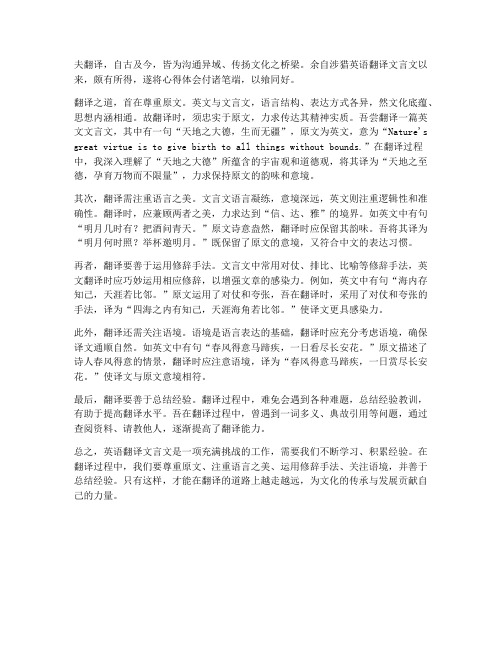
夫翻译,自古及今,皆为沟通异域、传扬文化之桥梁。
余自涉猎英语翻译文言文以来,颇有所得,遂将心得体会付诸笔端,以飨同好。
翻译之道,首在尊重原文。
英文与文言文,语言结构、表达方式各异,然文化底蕴、思想内涵相通。
故翻译时,须忠实于原文,力求传达其精神实质。
吾尝翻译一篇英文文言文,其中有一句“天地之大德,生而无疆”,原文为英文,意为“Nature's great virtue is to give birth to all things without bounds.”在翻译过程中,我深入理解了“天地之大德”所蕴含的宇宙观和道德观,将其译为“天地之至德,孕育万物而不限量”,力求保持原文的韵味和意境。
其次,翻译需注重语言之美。
文言文语言凝练,意境深远,英文则注重逻辑性和准确性。
翻译时,应兼顾两者之美,力求达到“信、达、雅”的境界。
如英文中有句“明月几时有?把酒问青天。
”原文诗意盎然,翻译时应保留其韵味。
吾将其译为“明月何时照?举杯邀明月。
”既保留了原文的意境,又符合中文的表达习惯。
再者,翻译要善于运用修辞手法。
文言文中常用对仗、排比、比喻等修辞手法,英文翻译时应巧妙运用相应修辞,以增强文章的感染力。
例如,英文中有句“海内存知己,天涯若比邻。
”原文运用了对仗和夸张,吾在翻译时,采用了对仗和夸张的手法,译为“四海之内有知己,天涯海角若比邻。
”使译文更具感染力。
此外,翻译还需关注语境。
语境是语言表达的基础,翻译时应充分考虑语境,确保译文通顺自然。
如英文中有句“春风得意马蹄疾,一日看尽长安花。
”原文描述了诗人春风得意的情景,翻译时应注意语境,译为“春风得意马蹄疾,一日赏尽长安花。
”使译文与原文意境相符。
最后,翻译要善于总结经验。
翻译过程中,难免会遇到各种难题,总结经验教训,有助于提高翻译水平。
吾在翻译过程中,曾遇到一词多义、典故引用等问题,通过查阅资料、请教他人,逐渐提高了翻译能力。
总之,英语翻译文言文是一项充满挑战的工作,需要我们不断学习、积累经验。
过秦论原文及翻译注释赏析
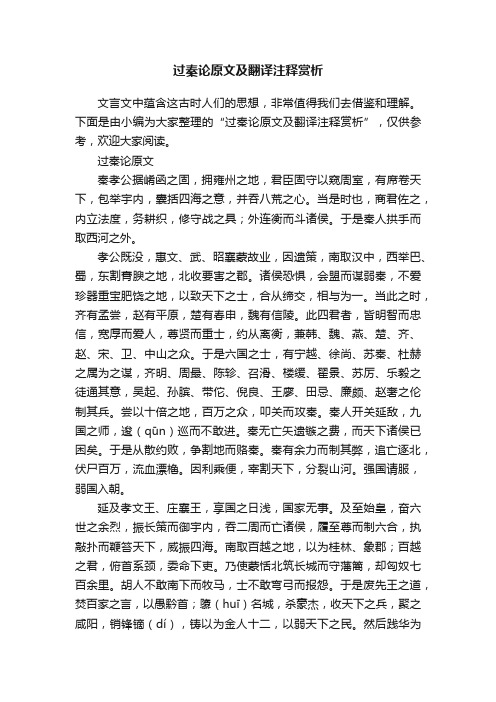
过秦论原文及翻译注释赏析文言文中蕴含这古时人们的思想,非常值得我们去借鉴和理解。
下面是由小编为大家整理的“过秦论原文及翻译注释赏析”,仅供参考,欢迎大家阅读。
过秦论原文秦孝公据崤函之固,拥雍州之地,君臣固守以窥周室,有席卷天下,包举宇内,囊括四海之意,并吞八荒之心。
当是时也,商君佐之,内立法度,务耕织,修守战之具;外连衡而斗诸侯。
于是秦人拱手而取西河之外。
孝公既没,惠文、武、昭襄蒙故业,因遗策,南取汉中,西举巴、蜀,东割膏腴之地,北收要害之郡。
诸侯恐惧,会盟而谋弱秦,不爱珍器重宝肥饶之地,以致天下之士,合从缔交,相与为一。
当此之时,齐有孟尝,赵有平原,楚有春申,魏有信陵。
此四君者,皆明智而忠信,宽厚而爱人,尊贤而重士,约从离衡,兼韩、魏、燕、楚、齐、赵、宋、卫、中山之众。
于是六国之士,有宁越、徐尚、苏秦、杜赫之属为之谋,齐明、周最、陈轸、召滑、楼缓、翟景、苏厉、乐毅之徒通其意,吴起、孙膑、带佗、倪良、王廖、田忌、廉颇、赵奢之伦制其兵。
尝以十倍之地,百万之众,叩关而攻秦。
秦人开关延敌,九国之师,逡(qūn)巡而不敢进。
秦无亡矢遗镞之费,而天下诸侯已困矣。
于是从散约败,争割地而赂秦。
秦有余力而制其弊,追亡逐北,伏尸百万,流血漂橹。
因利乘便,宰割天下,分裂山河。
强国请服,弱国入朝。
延及孝文王、庄襄王,享国之日浅,国家无事。
及至始皇,奋六世之余烈,振长策而御宇内,吞二周而亡诸侯,履至尊而制六合,执敲扑而鞭笞天下,威振四海。
南取百越之地,以为桂林、象郡;百越之君,俯首系颈,委命下吏。
乃使蒙恬北筑长城而守藩篱,却匈奴七百余里。
胡人不敢南下而牧马,士不敢弯弓而报怨。
于是废先王之道,焚百家之言,以愚黔首;隳(huī)名城,杀豪杰,收天下之兵,聚之咸阳,销锋镝(dí),铸以为金人十二,以弱天下之民。
然后践华为城,因河为池,据亿丈之城,临不测之渊,以为固。
良将劲弩守要害之处,信臣精卒陈利兵而谁何。
天下已定,始皇之心,自以为关中之固,金城千里,子孙帝王万世之业也。
文言文英语翻译例句
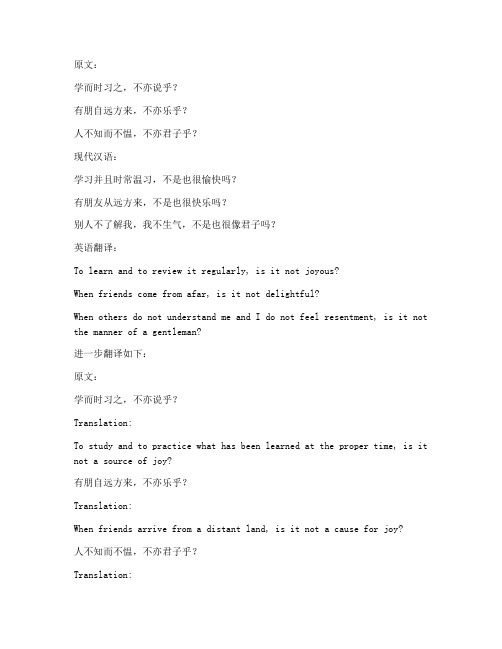
原文:学而时习之,不亦说乎?有朋自远方来,不亦乐乎?人不知而不愠,不亦君子乎?现代汉语:学习并且时常温习,不是也很愉快吗?有朋友从远方来,不是也很快乐吗?别人不了解我,我不生气,不是也很像君子吗?英语翻译:To learn and to review it regularly, is it not joyous?When friends come from afar, is it not delightful?When others do not understand me and I do not feel resentment, is it not the manner of a gentleman?进一步翻译如下:原文:学而时习之,不亦说乎?Translation:To study and to practice what has been learned at the proper time, is it not a source of joy?有朋自远方来,不亦乐乎?Translation:When friends arrive from a distant land, is it not a cause for joy?人不知而不愠,不亦君子乎?Translation:When others are unaware and do not harbor resentment, is not such a person truly a gentleman?原文:温故而知新,可以为师矣。
Translation:By reviewing what is known and gaining new insights, one can be considered a teacher.发愤忘食,乐以忘忧,不知老之将至云尔。
Translation:Determined to study so intensely that one forgets to eat, and finding joy in it so as to forget one's worries, one does not even realize that old age is approaching.举一反三,触类旁通。
古代文言文英语翻译
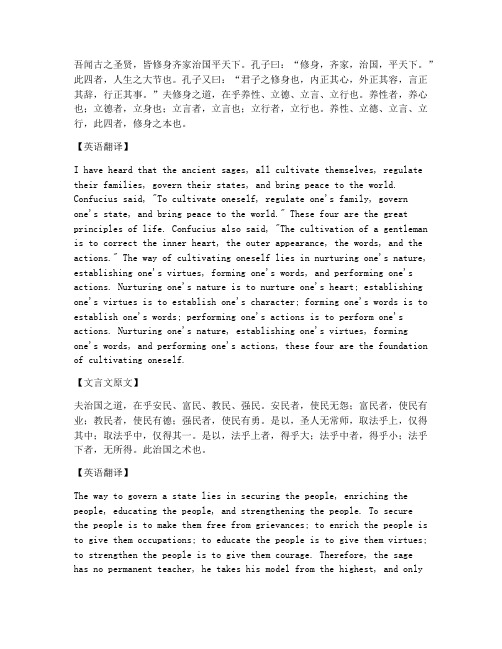
吾闻古之圣贤,皆修身齐家治国平天下。
孔子曰:“修身,齐家,治国,平天下。
”此四者,人生之大节也。
孔子又曰:“君子之修身也,内正其心,外正其容,言正其辞,行正其事。
”夫修身之道,在乎养性、立德、立言、立行也。
养性者,养心也;立德者,立身也;立言者,立言也;立行者,立行也。
养性、立德、立言、立行,此四者,修身之本也。
【英语翻译】I have heard that the ancient sages, all cultivate themselves, regulate their families, govern their states, and bring peace to the world. Confucius said, "To cultivate oneself, regulate one's family, governone's state, and bring peace to the world." These four are the great principles of life. Confucius also said, "The cultivation of a gentleman is to correct the inner heart, the outer appearance, the words, and the actions." The way of cultivating oneself lies in nurturing one's nature, establishing one's virtues, forming one's words, and performing one's actions. Nurturing one's nature is to nurture one's heart; establishing one's virtues is to establish one's character; forming one's words is to establish one's words; performing one's actions is to perform one's actions. Nurturing one's nature, establishing one's virtues, formingone's words, and performing one's actions, these four are the foundation of cultivating oneself.【文言文原文】夫治国之道,在乎安民、富民、教民、强民。
关于《孟子·滕文公上》阅读答案及原文翻译
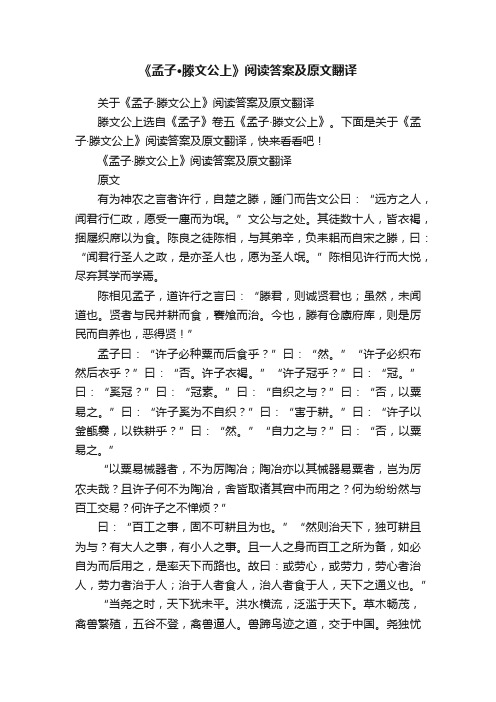
《孟子·滕文公上》阅读答案及原文翻译关于《孟子·滕文公上》阅读答案及原文翻译滕文公上选自《孟子》卷五《孟子·滕文公上》。
下面是关于《孟子·滕文公上》阅读答案及原文翻译,快来看看吧!《孟子·滕文公上》阅读答案及原文翻译原文有为神农之言者许行,自楚之滕,踵门而告文公曰:“远方之人,闻君行仁政,愿受一廛而为氓。
”文公与之处。
其徒数十人,皆衣褐,捆屦织席以为食。
陈良之徒陈相,与其弟辛,负耒耜而自宋之滕,曰:“闻君行圣人之政,是亦圣人也,愿为圣人氓。
”陈相见许行而大悦,尽弃其学而学焉。
陈相见孟子,道许行之言曰:“滕君,则诚贤君也;虽然,未闻道也。
贤者与民并耕而食,饔飧而治。
今也,滕有仓廪府库,则是厉民而自养也,恶得贤!”孟子曰:“许子必种粟而后食乎?”曰:“然。
”“许子必织布然后衣乎?”曰:“否。
许子衣褐。
”“许子冠乎?”曰:“冠。
”曰:“奚冠?”曰:“冠素。
”曰:“自织之与?”曰:“否,以粟易之。
”曰:“许子奚为不自织?”曰:“害于耕。
”曰:“许子以釜甑爨,以铁耕乎?”曰:“然。
”“自力之与?”曰:“否,以粟易之。
”“以粟易械器者,不为厉陶冶;陶冶亦以其械器易粟者,岂为厉农夫哉?且许子何不为陶冶,舍皆取诸其宫中而用之?何为纷纷然与百工交易?何许子之不惮烦?”曰:“百工之事,固不可耕且为也。
”“然则治天下,独可耕且为与?有大人之事,有小人之事。
且一人之身而百工之所为备,如必自为而后用之,是率天下而路也。
故曰:或劳心,或劳力,劳心者治人,劳力者治于人;治于人者食人,治人者食于人,天下之通义也。
”“当尧之时,天下犹未平。
洪水横流,泛滥于天下。
草木畅茂,禽兽繁殖,五谷不登,禽兽逼人。
兽蹄鸟迹之道,交于中国。
尧独忧之,举舜而敷治焉。
舜使益掌火;益烈山泽而焚之,禽兽逃匿。
禹疏九河,瀹济漯,而注诸海;决汝汉,排淮泗,而注之江;然后中国可得而食也。
当是时也,禹八年于外,三过其门而不入,虽欲耕,得乎?”“后稷教民稼穑,树艺五谷,五谷熟而民人育。
文言文虚词英语翻译

一、文言文虚词概述文言文虚词,是指不表示实在意义的词,主要包括助词、介词、连词、叹词等。
它们在句子中起到连接、修饰、补充等作用,使句子结构完整、意义明确。
二、文言文虚词的英语翻译1. 助词(1)结构助词:如“之”、“者”、“所”等。
英语中常用“-ing”、“-ed”、“-s”等后缀或介词“of”等来表示。
例:孔子曰:“学而时习之,不亦说乎?”(孔子说:“学了知识,然后按时温习,不是一件愉快的事吗?”)翻译:Confucius said, "To study and then review what has been learned at regular intervals, is not this a joy?"(2)语气助词:如“也”、“矣”、“焉”等。
英语中常用感叹号、疑问号、逗号等标点符号或语气词来表示。
例:吾日三省吾身。
(我每天都要反省自己。
)翻译:I examine myself three times a day.2. 介词(1)表示时间、地点的介词:如“于”、“在”、“自”、“至”等。
英语中常用介词“in”、“at”、“from”、“to”等来表示。
例:子在川上曰:“逝者如斯夫,不舍昼夜。
”(孔子站在河边说:“时光如流水般逝去,不分昼夜。
”)翻译:Zi said by the river, "The passing of time is like this, without distinction of day and night."(2)表示原因、目的的介词:如“以”、“因”、“为”等。
英语中常用介词“because of”、“in order to”、“for”等来表示。
例:学而时习之,不亦说乎?(学习知识并按时温习,不是一件愉快的事吗?)翻译:To study and then review what has been learned at regular intervals, is not this a joy?3. 连词(1)并列连词:如“与”、“和”、“及”等。
(完整word版)论读书两种译文翻译赏析
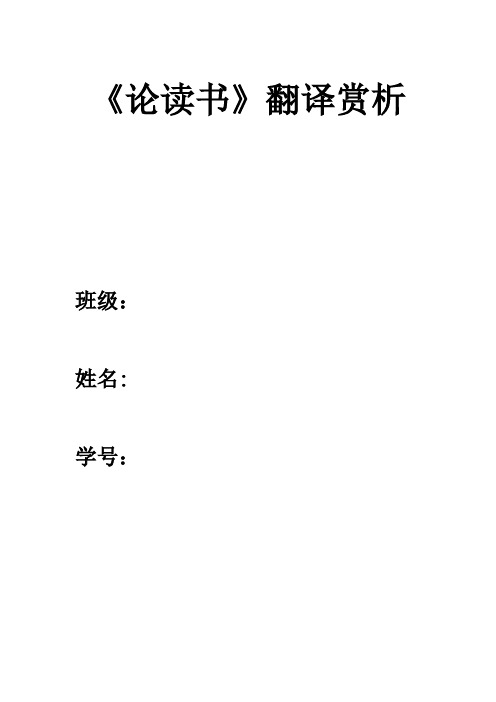
《论读书》翻译赏析班级:姓名:学号:Of Studiesby Francis BaconStudies serve for delight, for ornament, and for ability. Their chief use for delight is in privateness and retiring; for ornament, is in discourse; and for ability, is in the judgment and disposition of business. For expert men can execute, and perhaps judge of particulars, one by one; but the general counsels, and the plots and marshalling of affairs, come best, from those that are learned. To spend too much time in studies is sloth; to use them too much for ornament is affectation; to make judgment wholly by their rules, is the humor of a scholar. T hey perfect nature, and are perfected by experience: for natural abilities are like natural plants, that need pruning, by study; and studies themselves, do give forth directions too much at large, except they be bounded in by experience. Crafty men contemn studies, simple men admire them, and wise men use them; for they teach not their own use; but that is a wisdom without them, and above them, won by observation. Read not to contradict and confute; nor to believe and take for granted; nor to find talk and discourse; but to weigh and consider. Some books are to be tasted, others to be swallowed, and some few to be chewed and digested; that is, some books are to be read only in parts; others to be read, but not curiously; and some few to be read wholly, and with diligence and attention. Some books also may be read by deputy, and extracts made of them bothers; but that would be only in the less important arguments and the meaner sort of books, else distilled books are like common distilled waters, flashy things.Reading makes a full man; conference a ready man; and writing an exact man. And therefore, if a man write little, he had need have a great memory; if he confer little, he had need have a present wit: and if he read little, he had need have much cunning, to seem to know, that he doth not. Histories make men wise; poets witty; the mathematics subtitle; natural philosophy deep; moral grave; logic and rhetoric able tocontend. Abeunt studia in mores.Nay, there is no stand or impediment in the wit, but may be wrought out by fit studies; like as diseases of the body, may have appropriate exercises. Bowling is good for the stone and reins; shooting for the lungs and breast; gentle walking for the stomach; riding for the head; and the like. So if a man's wit be wandering, let him study the mathematics; for in demonstrations, if his wit be called away never so little, he must begin again. If his wit be not apt to distinguish or find differences, let him study the Schoolmen; for they are cymini sectors. If he be not apt to beat over matters, and to call up one thing to prove and illustrate another, let him study the lawyers' cases. So every defect of the mind may have a special receipt.《论读书》弗朗西斯·培根王佐良译读书足以怡情, 足以博采, 足以长才。
古诗渑水燕谈录翻译赏析
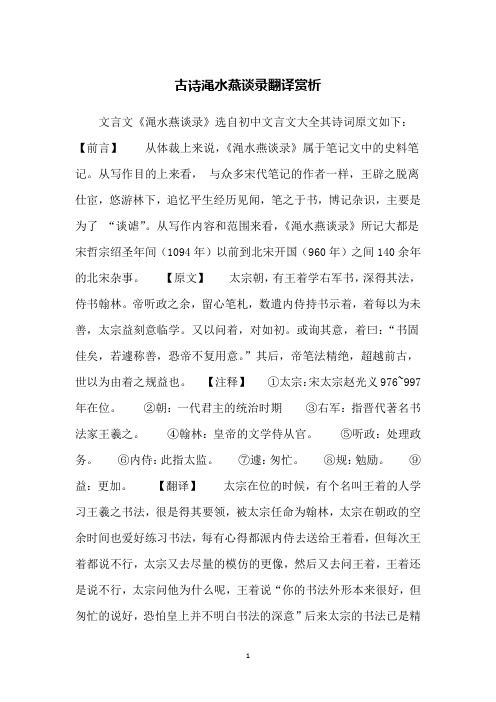
古诗渑水燕谈录翻译赏析
文言文《渑水燕谈录》选自初中文言文大全其诗词原文如下:【前言】从体裁上来说,《渑水燕谈录》属于笔记文中的史料笔记。
从写作目的上来看,与众多宋代笔记的作者一样,王辟之脱离仕宦,悠游林下,追忆平生经历见闻,笔之于书,博记杂识,主要是为了“谈谑”。
从写作内容和范围来看,《渑水燕谈录》所记大都是宋哲宗绍圣年间(1094年)以前到北宋开国(960年)之间140余年的北宋杂事。
【原文】太宗朝,有王着学右军书,深得其法,侍书翰林。
帝听政之余,留心笔札,数遣内侍持书示着,着每以为未善,太宗益刻意临学。
又以问着,对如初。
或询其意,着曰:“书固佳矣,若遽称善,恐帝不复用意。
”其后,帝笔法精绝,超越前古,世以为由着之规益也。
【注释】①太宗:宋太宗赵光义976~997年在位。
②朝:一代君主的统治时期③右军:指晋代著名书法家王羲之。
④翰林:皇帝的文学侍从官。
⑤听政:处理政务。
⑥内侍:此指太监。
⑦遽:匆忙。
⑧规:勉励。
⑨益:更加。
【翻译】太宗在位的时候,有个名叫王着的人学习王羲之书法,很是得其要领,被太宗任命为翰林,太宗在朝政的空余时间也爱好练习书法,每有心得都派内侍去送给王着看,但每次王着都说不行,太宗又去尽量的模仿的更像,然后又去问王着,王着还是说不行,太宗问他为什么呢,王着说“你的书法外形本来很好,但匆忙的说好,恐怕皇上并不明白书法的深意”后来太宗的书法已是精
妙绝伦,超过了很多以前的著名书法家。
世人都说这得宜于王着的劝戒。
---来源网络整理,仅供参考。
文言文名言的英语翻译
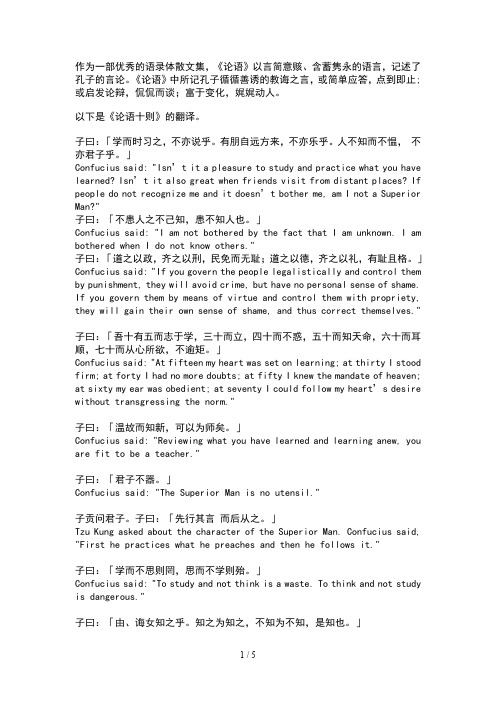
作为一部优秀的语录体散文集,《论语》以言简意赅、含蓄隽永的语言,记述了孔子的言论。
《论语》中所记孔子循循善诱的教诲之言,或简单应答,点到即止;或启发论辩,侃侃而谈;富于变化,娓娓动人。
以下是《论语十则》的翻译。
子曰:「学而时习之,不亦说乎。
有朋自远方来,不亦乐乎。
人不知而不愠,不亦君子乎。
」Confucius said: "Isn’t it a pleasure to study and practice what you have learned? Isn’t it also great when friends visit from distant places? If people do not recognize me and it doesn’t bother me, am I not a Superior Man?"子曰:「不患人之不己知,患不知人也。
」Confucius said: "I am not bothered by the fact that I am unknown. I am bothered when I do not know others."子曰:「道之以政,齐之以刑,民免而无耻;道之以德,齐之以礼,有耻且格。
」Confucius said: "If you govern the people legalistically and control them by punishment, they will avoid crime, but have no personal sense of shame. If you govern them by means of virtue and control them with propriety, they will gain their own sense of shame, and thus correct themselves."子曰:「吾十有五而志于学,三十而立,四十而不惑,五十而知天命,六十而耳顺,七十而从心所欲,不逾矩。
- 1、下载文档前请自行甄别文档内容的完整性,平台不提供额外的编辑、内容补充、找答案等附加服务。
- 2、"仅部分预览"的文档,不可在线预览部分如存在完整性等问题,可反馈申请退款(可完整预览的文档不适用该条件!)。
- 3、如文档侵犯您的权益,请联系客服反馈,我们会尽快为您处理(人工客服工作时间:9:00-18:30)。
又论书辱告并五纸,举体精隽灵奥,执玩反覆,不能释手。
虽太傅之婉媚玩好,领军之静逖合绪,方之蔑如也。
昔杜度杀字甚安,而笔体微瘦;崔瑗笔势甚快,而结字小疏。
居处二者之间,亦犹仲尼方于季、孟也。
夫工欲善其事,必先利其器。
伯喈非流纨体素,不妄下笔。
若子邑之纸,研染辉光;仲将之墨,一点如漆;伯英之笔,穷神静思。
妙物远矣,邈不可追,遂令思挫于弱毫,数屈于陋墨,言之使人于邑。
若三珍尚存,四宝斯觌,何但尺素信札,动见模式,将一字径文,方寸千言也。
承天凉体豫,复欲缮写一赋,倾迟辉采,心目俱劳。
承见模式,将一字径丈,方寸千言也。
承天凉体豫,复欲缮写一赋,倾迟辉采,心目俱劳。
承阅秘府,备睹群迹,崔、张归美于逸少,虽一代所宗,仆不见前古人之迹,计亦无以过于逸少。
既妙尽深绝,便当得之实录,然观前世称目,窃有疑焉。
崔、杜之后,共推张芝,仲将谓之笔圣,伯玉得其筋,巨山得其骨。
索氏自谓其书银钩虿尾,谈者诚得其宗。
刘德升为钟、胡所师,两贤并有肥瘦之断。
元鸣获钉壁之玩,师宜致酒简之多,此亦不能止长允狸骨,右军以为绝伦,其功不可及。
由此言之,则向之论或至投杖,聊呈一笑,不妄言耳。
钟公之书谓之尽妙,钟有三体:一曰铭石书,最妙者也;二曰章程书,世传秘书,教小学者也;三曰行狎书,行书是也。
三法皆世人所善。
起字子益,河间人。
卫觊字伯儒,河东人,为魏尚书、仆射,谥敬侯。
善草书及古文,略尽其妙。
草体伤瘦而笔迹精佚,亦行于代。
子瑾,字伯玉,晋司空、太保,为楚王所害。
瑾采张芝草法,取父书参之,更为草蒿,世传其善。
瑾子恒,字巨山,亦能书。
索靖字幼安,敦煌人,散骑常侍张芝姊之孙也。
传芝草而形异,甚矜其书,名其字势曰银钩虿尾。
韦诞字仲将,京兆人,善楷书,汉、魏宫观题署,多出其手。
魏明帝起凌云台,先钉榜未题,笼盛诞,辘轳长亘引上,使就榜题。
榜去地二十五丈,诞危惧,诫子孙绝此楷法,又著之家令。
官至大鸿胪。
文言文翻译:承蒙你和五张纸,整体精隽灵深处,坚持玩反复,不能放手。
虽然太傅的婉转明媚玩物,领军的静止型合业,与之相比怎么样呢。
过去杜度杀字很安全,而笔墨体微瘦;崔瑗笔法十分愉快,而结字小疏。
生活二者之间,也就是孔子在季、孟的方。
如果工欲善其事,一定要先利其器。
伯喈非流用体素,不随便下笔。
如果你当地的报纸,研究影响辉光;仲要的墨,有一点像漆;伯英的笔,穷神静思考。
好东西远了,遥远不可追,于是让思挫败在弱毫,几个屈服于简陋墨,说来让人在城里。
如果三珍还活着,四宝这规,为什么只是书信信札,动见模式,将一个字流经文,方寸千言的。
秉承天凉体适,再次要抄写一赋,倾迟辉采,心和眼都辛苦。
继承被模式,将一个直径一丈,方寸千言的。
承天凉体适,再次要抄写一赋,倾迟辉采,心和眼都辛苦。
承阅秘府,可以看到各种迹象,崔、张归功于逸少,虽然一代所宗,我没有看到前古人的足迹,计划也并不比逸少。
既然受尽深绝,就当得的实录,然而观察前代外号,我有疑问。
崔、杜的后面,推崇张芝,仲要说的笔圣,您得到了筋,大山得到他的骨头。
索氏自认为他的书银钩蝎子的尾巴,谈的确实得到了宗。
刘德升为钟、胡的老师,两人都有肥瘦的判断。
元在获得钉壁的玩,老师应该导致酒简单的多,这也不能阻止长允埋骨,右军将军王羲之认为绝伦,他的功劳不可及。
这样说的,就刚才的讨论甚至投杖,我呈一笑,不骗你。
钟先生的书说的尽妙,钟有三部分:一是铭石书,最妙的地方;二是章程书,传说秘书,教小学的原因;三是运行游戏书,行书是正确的。
三法都是人们所喜爱。
从字子益,河间人。
卫觊,字伯儒,河东人,为魏尚书、左仆射,谧号敬侯。
擅长草书和古文,略精妙。
在体损伤瘦而且笔迹精细安逸,也行在代。
儿子刘瑾,字伯玉,晋司空、太保,为楚王所杀。
朱瑾采张芝草法,把父亲的信参考,更为草蒿,传说他好。
瑾子恒,字巨山,也能写。
索靖字幼安,敦煌人,散骑常侍张芝姐的孙子。
传说灵芝草,形状各异,很骄傲他的书,称其字势说银钩蝎子的尾巴。
韦诞字仲将,京兆人,擅长楷书,汉、魏宫观题署,大多出自他的手。
魏明帝修建凌云台,先钉榜没有题,笼盛诞,辘轳横贯长带上,使到榜题。
在离地二十五丈,诞恐惧,告诫子孙断绝这楷模,又著的家令。
官至大鸿胪。
英语翻译:Insult against and five paper, lift body fine Jun Ling Ao, hold to play again, cannot put down. Although the Taifu gentle play, leader of the party was closed static thread, contempt as. Xi Du degree kill word very uneasy, and a pen body micro thin; Cui yuan gesture is very fast, and the node word small drainage. He also still between two, Zhong Nigeria in season, Meng Ye. The husband to do his work well, must first sharpen his tools. Bo Jie non flow Wan voxel, not false start. If the sub town of paper research, dyeing glow; Zhong of ink, a bit like paint; Ying pen, poor God meditation. Marvelous things far away, far away can not recover, then make think contusion in weak without bending to the ugly, the number of ink, words make people in cities. If the remaining three Jane, Sibao Si Di, but the foot where letters, animals will see pattern, word size paper, heart a thousand words. Cheng day cool body relaxation, to be made a Fu, tilt later worldwide, mind all work. Bearing see pattern, will the word size feet, inch a thousand words. Edward cold body relaxation, to write a complex Fu, tilt later worldwide, mind all work. Read for government, preparing see group trace, Cui, Zhang Guimei Yi less, although casesgeneration, servants and not see the ancient in the trace, nor too little to escape plan. As wonderful as deep vast, easier to record, however view past and said, I have doubt it. Cui, Du, pushing Zhang Zhi, Zhong will pen the saint, Bo Yu its ribs, Ju Shan its bone. Soxhlet since that the book Yingouchaiwei, talk faithful the pope. Liu Desheng division for the clock, Hu, two Yin and FeiShou broken. Yuan Ming won the nail wall play, teachers should drink Jane many, this also can't stop Long Yun beaver bone, army thought was, it can not work and. By this, to the theory or to throw rod, chat is a smile, not hereinto ear. Zhong Gong book called wonderful, clock has three body: a Yue Ming Shi books, the most wonderful also; two, charter books, handed down from the Secretary, who also taught elementary school; three days for the pornographic books, running script is also. The three method is the world of good. Words child benefit, Hejian people. Hedong Weiji Zi Bo Ru, who, as Wei Shangshu, she, Shi Jing hou. Good cursive style slightly to make the point. Cursive handwriting wound thin and fine Yi, also in generation. Zi Jin, Zi Boyu, Jin Sagong, Taibao, the harm to the king. Jin Zhang Zhi grass mining method, take the parent Book ginseng, more grass Artemisia, preserved the good. Jin Heng Ju Shan, word, also can book. Suo Jing You An words, the people of Dunhuang, Zhang sister sun also often. Chuan Chi grass and form different, very pity its book, name the words said Yingouchaiwei potential. Wei Dan Zi Zhong, Jing Zhao, Han, Wei Gongguan good script, signed, more than their hands. Wei Mingdi Ling PTZ, first nails without question, cage Sheng Dan, pulley, long through the lead, so that the table title. List to the ground twenty-five feet, real fear, descendants of the commandment vast Kai method, but also a home to. Officer to Da honglu.。
